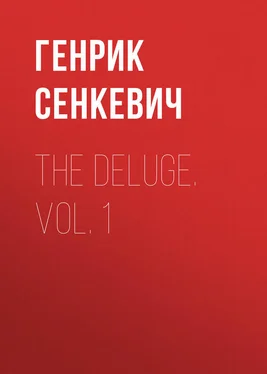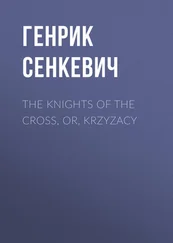Генрик Сенкевич - The Deluge. Vol. 1
Здесь есть возможность читать онлайн «Генрик Сенкевич - The Deluge. Vol. 1» — ознакомительный отрывок электронной книги совершенно бесплатно, а после прочтения отрывка купить полную версию. В некоторых случаях можно слушать аудио, скачать через торрент в формате fb2 и присутствует краткое содержание. Жанр: foreign_antique, foreign_prose, на английском языке. Описание произведения, (предисловие) а так же отзывы посетителей доступны на портале библиотеки ЛибКат.
- Название:The Deluge. Vol. 1
- Автор:
- Жанр:
- Год:неизвестен
- ISBN:нет данных
- Рейтинг книги:4 / 5. Голосов: 1
-
Избранное:Добавить в избранное
- Отзывы:
-
Ваша оценка:
- 80
- 1
- 2
- 3
- 4
- 5
The Deluge. Vol. 1: краткое содержание, описание и аннотация
Предлагаем к чтению аннотацию, описание, краткое содержание или предисловие (зависит от того, что написал сам автор книги «The Deluge. Vol. 1»). Если вы не нашли необходимую информацию о книге — напишите в комментариях, мы постараемся отыскать её.
The Deluge. Vol. 1 — читать онлайн ознакомительный отрывок
Ниже представлен текст книги, разбитый по страницам. Система сохранения места последней прочитанной страницы, позволяет с удобством читать онлайн бесплатно книгу «The Deluge. Vol. 1», без необходимости каждый раз заново искать на чём Вы остановились. Поставьте закладку, и сможете в любой момент перейти на страницу, на которой закончили чтение.
Интервал:
Закладка:
Henryk Sienkiewicz
The Deluge: An Historical Novel of Poland, Sweden, and Russia. Vol. 1 (of 2)
TO HON. CHARLES A. DANA,
Sir, – I beg to dedicate to you this translation of a remarkable work, touching a period eventful in the history of the Poles, and the Slav race in general. You will appreciate the pictures of battle and trial contained in these volumes, for you know great events not from books merely but from personal contact. You receive pleasure from various literatures, and from considering those points of character by which nations and men are distinguished; hence, as I think, The Deluge will give you some mental enjoyment, and perhaps turn your attention to a new field of history.
JEREMIAH CURTIN.Smithsonian Institution, Bureau of Ethnology,
November 25, 1891.
INTRODUCTION
The wars described in The Deluge are the most complicated and significant in the whole career of the Commonwealth, for the political motives which came into play during these wars had their origin in early and leading historical causes.
The policy of the Teutonic Knights gave the first of its final results in the war of 1655, between Sweden and Poland, since it made the elector independent in Prussia, where soon after, his son was crowned king. The war with Great Russia in 1654, though its formal cause came, partly at least, from the struggle of 1612, in which the Poles had endeavored to subjugate Moscow, was really roused by the conflict of Southern Russian with Poland to win religious and material equality.
The two fundamental events of Polish history are the settlement of the Teutonic Knights in Prussia, through the action of the Poles themselves; and the union of Poland with Lithuania and Russia by the marriage of Yadviga, the Polish princess, to Yagyello, Grand Prince of Lithuania.
Before touching on the Teutonic Knights, a few words may be given to the land where they began that career which cut off Poland from the sea, took from the Poles their political birthplace, and gave its name and territory to the chief kingdom of the new German Empire, the kingdom which is in fact the creator and head of that Empire.
Prussia in the thirteenth century extended from the Vistula eastward to the Niemen, and from the Baltic southward about as far as it does at present. In this territory lived the Prussians. East of the Niemen lived the Lithuanians, another division of the same stock of people. West of the Vistula lay Pomorye, 1 1 Means "On the sea."
now Pomerania, occupied at that time exclusively by Slavs under Polish dominion.
The Prussians, a people closely related to the Slavs, were still Pagans, as were also the Lithuanians; and having a more highly developed religion than either the pre-Christian Slavs or the Germans, their conversion was likely to be of a more difficult nature.
At the end of the tenth and in the beginning of the thirteenth centuries attempts were made to convert the Prussians; but the only result was the death of the missionaries, who seem to have been too greatly filled with zeal to praise their own faith and throw contempt on that of the people among whom they were really only guests and sojourners.
Finally, a man appeared more adroit and ambitious than others, – Christian, a monk of Olivka, near Dantzig. This monk, we are told, had a knowledge of the weak points of men, spoke Prussian as well as Polish, was not seeking the crown of martyrdom, and never made light of things held sacred by those to whom he was preaching. After a few years his success was such as to warrant a journey to Rome, where he explained to Innocent III. the results of his labor. The Pope encouraged the missionary, and in 1211 instructed the Archbishop of Gnezen to aid Christian with his co-workers and induce secular princes to help them.
Christian returned from Rome with renewed zeal; but instead of being helped he was hindered, for tribute and labor were imposed on his converts by the secular power. Since the new religion was coupled with servitude, the Prussians were roused greatly against it.
Christian strove to obtain relief for his converts, but in vain. Then, taking two native followers, he made a second journey to Rome, was created first Bishop of Prussia, and returned again to the field.
The great body of Prussians now considered all converts as traitors. The priests of the native religion roused the people, and attacked those persons as renegades who had deserted the ancient faith and were bringing slavery to the country. They went farther and fell upon Mazovia, whence the propaganda had issued. Konrad, unable to defend himself, bought them off with rich presents. The newly made converts were killed, captured, or driven to deep forests.
Christian turned to the Pope a third time, and implored him to direct against Prussia those Poles who were going to the Holy Land.
The Archbishop of Gnezen was instructed from Rome to make this change, and the Poles were summoned against Prussia for the following year. The crusade was preached also in Germany.
Warriors arrived from both countries in fairly large numbers, and during their presence ruined villages and churches were rebuilt in the district of Culm, where the conversions had taken place mainly. In a couple of seasons the majority of the warriors found their way home again. A second crusade was proclaimed, and men responded freely. All these forces were simply guarding the missionaries and the converts, – a position which could not endure.
Christian, seeing this, formed the plan of founding an order of armed monks in Poland like the Knights of the Sword in Livonia. Konrad gave his approval at once.
The Bishop of Modena, at that time papal legate in Poland, hastened the establishment of the order; for to him it seemed the best agent to bend the stiff necks of idolaters. Permission to found the order was obtained from the Pope, and a promise of means to maintain it from Konrad.
Christian, who had interested Rome and the West in his work, now gave great praise before the world to the Prince of Mazovia, who thereupon rewarded him with a gift of twelve castles and one hundred villages, reserving merely sovereign rights without income. This gift was confirmed to the Bishop of Prussia by Honorius III.
Christian labored so zealously that in 1225 he consecrated twenty-five superior knights in his new order, which received the same rules as the Livonian Knights of the Sword, – that is, the rules of the Templars.
The new knights were called Brothers of Dobjin, from the castle of Dobjin, which Konrad gave them as a residence, adding the district of Leslin near Inovratslav as a means of support.
As soon as the Brothers had settled in their castle, they attacked the Prussians, ruined villages, and brought in plunder. The enraged Prussians collected large forces, and attacked the land of Culm, with the intent to raze Dobjin. On hearing this, Konrad with his own troops and a general levy hastened to the relief of the order.
A bloody and stubborn battle of two days' duration was fought with great loss on both sides. Konrad, despairing of victory, left the field, thus causing the complete overthrow of the Poles. The surviving Brothers of Dobjin took refuge in the castle, which the Prussians were unable to capture. The order, shattered at its very inception, hoped for reinforcements from abroad; but the Pope at that juncture was sending a crusade to Palestine, and would not permit a division in the forces of the West. The Prussians, elated with victory, plundered at pleasure the lands bordering on their own.
In this disaster Christian conceived the idea of calling in the Teutonic Knights against Prussia. This idea, suicidal from a Polish point of view, was accepted by the Prince of Mazovia.
Читать дальшеИнтервал:
Закладка:
Похожие книги на «The Deluge. Vol. 1»
Представляем Вашему вниманию похожие книги на «The Deluge. Vol. 1» списком для выбора. Мы отобрали схожую по названию и смыслу литературу в надежде предоставить читателям больше вариантов отыскать новые, интересные, ещё непрочитанные произведения.
Обсуждение, отзывы о книге «The Deluge. Vol. 1» и просто собственные мнения читателей. Оставьте ваши комментарии, напишите, что Вы думаете о произведении, его смысле или главных героях. Укажите что конкретно понравилось, а что нет, и почему Вы так считаете.











